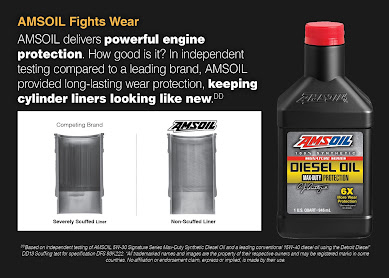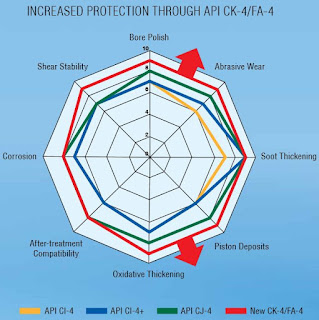From stationary engines to heavy-duty equipment and even passenger cars, natural-gas engines are becoming more prominent.
Mark Nyholm | Technical Product Manager - Heavy Duty - AMSOIL Inc.
Alternative fuels have been the talk of the town for over 10 years now, and the quest to reduce engine emissions, fuel costs and dependence on foreign oil often leads to fuels other than gasoline or diesel. Natural gas is one of these upand-
coming alternative fuels. For many of us, natural gas heats our homes and runs our stoves, water heaters and clothes dryers. This low-carbon fuel is making its way to powering a variety of natural gas engines for both stationary and vehicular applications. Compared to the relatively complex chemical structures of gasoline and diesel, natural gas has a relatively simple chemical makeup primarily composed of methane. When natural gas is burned, it produces fewer pollutant emissions than coal or petroleum products, which makes it a natural choice on the quest to reduce engine emissions.
Three varieties of natural gas are used: compressed natural gas (CNG), liquefied natural gas (LNG) and renewable natural gas (RNG) or biomethane. CNG is natural gas compressed into high-pressure containers for storage or transport. LNG is achieved by cooling natural gas to -260°F at atmospheric pressure. LNG is 1/600th the volume of natural gas at atmospheric temperature and pressure, making it ideal for applications that are
weight or space limited. Biomethane, or biogas, is a naturally occurring, renewable energy source created by the breakdown of organic matter, such as farm and landfill waste. This low-carbon organic waste can be processed to high-quality natural gas suitable for use in pipeline or a variety of stationary and vehicular engines.
Vehicular natural gas engines are used in many mobile applications, including public transit buses, refuse haulers, delivery trucks, school buses and many other medium-/heavy-duty trucks. Natural gas has even made its presence into a few small passenger vehicles such as the Honda Civic; and Ford, General Motors and Ram have natural-gas-powered light-duty pickup trucks. Because of the limitations in engine availability, the heavy-duty market is primarily where natural gas is being used today. The limited number of natural-gas filling stations has also put constraints on the expansion of applications outside of engines either directly connected to the natural-gas pipeline or to vehicles that return to base daily. So if you are looking for natural-gas-powered vehicles, think locally and look at medium- to heavy-duty applications performing duties similar to diesel-powered vehicles.
Nearly all the natural gas used in North America is produced domestically, allowing local control over the energy supply. The cost of natural gas is substantially less than diesel or gasoline, resulting in reduced fuel costs. Many cities and states are looking to natural gas for two main reasons: First, natural gas engines are much quieter than their diesel counterparts. An idling diesel engine can be up to 10 times louder than a natural-gas engine. Because these engines often operate in the public sector, reducing engine noise creates more peaceful environments for operators, passengers and bystanders alike. Second, natural gas produces lower levels of nitrogen oxides and particulate matter emissions than diesel. Complying with the emissions regulations set forth by the Environmental Protection Agency (EPA) or the California Air Resources Board (CARB) has become essential to conducting business in North America.
Natural-gas engines have specific lubrication demands that differ from those of diesel and gasoline engines. AMSOIL continues to be at the forefront of natural gas engine lubrication and is involved in various natural-gas organizations. We have run multiple field trials proving our superior lubrication chemistry, and we continue to strive to improve lubrication for these engines through analytical and laboratory testing.
AMSOIL Synthetic Vehicular Natural Gas Engine Oil (ANGV) and
AMSOIL Synthetic Stationary Natural Gas Engine Oil (ANGS) both feature a low-ash formulation to minimize deposits that can lead to engine knocking and valve recession, while anti-wear additives provide excellent wear protection. Their thermal stability minimizes oxidation, and their low volatility reduces oil consumption. With oil analysis, both are proven for use in extended-drain-interval applications.
Although natural-gas vehicles currently represent a small percentage of the overall vehicle market, steady growth over the next decade is expected. A study from Pike Research (a research and consulting firm focusing on clean technology markets) forecasts worldwide sales of natural-gas trucks to grow at a compound annual growth rate (assuming a steady rate of growth much like the rate of return on an investment) of 14 percent between 2012 and 2019. The vehicular natural-gas market represents another arena of opportunity for AMSOIL Dealers, now and in the future. Remember, although these heavy-duty engines are similar to diesel engines, they do come with some very important differences that you should be aware of. Take a little time some evening and Google “natural-gas vehicles.” Prepare to be astonished at the quantity of information about natural gas that has made its way into our lifestyles already.
For more information on
AMSOIL Synthetic Motor Oils including Synthetic Natural Gas Engine Oil and Synthetic Diesel Oils.






